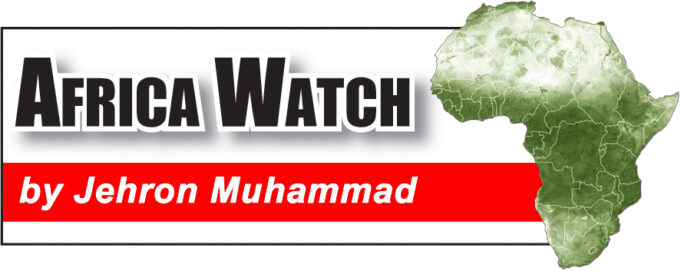Western media outlets in many cases have wrongly accused Africa of siding with Russia in its war against Ukraine. No mention is ever made of NATO’s involvement in provoking Russia’s recent invasion.
“The war could have been avoided if NATO had heeded the warnings from amongst its own leaders and officials over the years that its eastward expansion would lead to greater, not less, instability in the region,” South Africa President Cyril Ramaphosa said recently while addressing the South African parliament.
The UN General Assembly since the conflict passed a resolution condemning Russia’s action in Ukraine, with 141 countries voting in favor of it. African states accounted for nearly half of the 35 countries that abstained from the vote. They included the Central African Republic, Congo, Mali, Madagascar, Mozambique, Senegal, South Africa, Sudan, South Sudan, Uganda, and Zimbabwe. Other African states avoided the vote altogether, with Eritrea voting against.
CNN resurfaced Cold War language, accusing Africa, not of responding to its dependence on Russia and Ukraine agricultural goods, but stating that Russia has “established itself as one of Africa’s most valuable trading partners–becoming a major supplier of military hardware with key alliances in Nigeria, Libya, Ethiopia and Mali.”
A CNN analysis headlined “Why some African countries are thinking twice about calling out Putin,” states, “Africa accounted for 18% of Russian arms exports between 2016 and 2020, according to the Stockholm International Peace Research Institute (SIPRI) think tank.” No mention is made of the history of U.S. military presence in Africa as currently represented by AFRICOM.
Not to be outdone, London’s Financial Times via “South Africa’s main opposition” accused the South African government–as the continent’s most industrialized economy in its refusal to condemn the invasion of Ukraine–of signaling its “tacit support” of the action under a “shameful veneer of neutrality.”
No mention is made that Africa, thinking in its best interest, is responding to price hikes of stable foods and farming inputs.
“I am deeply concerned that the violent conflict in Ukraine, already a catastrophe for those directly involved, will also be a tragedy for the world’s poorest people living in rural areas who cannot absorb the price hikes of staple foods and farming inputs that will result from disruptions to global trade,” said Gilbert F. Houngbo, president of the Fund for Agricultural Development (IFAD). “We are already seeing price hikes, and this could cause an escalation of hunger and poverty with dire implications for global stability.”
Forty percent of wheat and corn from Ukraine go to the Middle East and Africa, which are already grappling with hunger issues, and where further food shortages or price increases risk pushing millions more people into poverty. In addition, Russia is the world’s largest fertilizer producer. Even before the conflict with Ukraine, spikes in fertilizer prices last year contributed to a rise in food prices by about 30%.
“Ukraine has more arable land than any other European country and 25% of the world’s total volume of black soil, which is particularly fertile. This has helped Ukraine (and Russia) become a global agricultural powerhouse. Together, Russia and Ukraine produce around 27% of the world’s barley, 34% of its wheat, and 73% of its sunflower oil. Most exports of these products move through Odessa and other ports on the Black Sea, which are now closed to commercial shipping,” according to European Council on Foreign Relations.
So why is the U.S.-led NATO and its complicit press framing Africa as being in bed with its Russian enemy instead of becoming a possible arbiter for peace and protecting vital agricultural interest?
According to CNN, President Ramaphosa “baffled many diplomats when, fresh from a phone call with President Vladimir Putin, he said the country had been approached to mediate in the conflict between Russia and Ukraine.” If Israel can claim mediation status, and the US and the European Union, represented by French President Emmanuel Macron, can continue talks with Putin, why can’t Africa, serving its own interest, try and broker a peace deal? Another way of saying this is, how can Israel, accused of apartheid crimes by Amnesty International against its Palestinian “captives,” and the US, which committed war crimes during its illegal invasion of Iraq, and the US and France’s criminal overthrow in 2011 of the legitimate government of Libya, justify their serving as mediators?
At the February summit between the EU and the African Union, Pres. Ramaphosa “forcefully” pointed out that some African leaders no longer see Western countries as reliable partners, reported the European Council on Foreign Relations.
Prior to the Russian invasion, the worsening of Africa’s long-standing food crisis during the COVID-19 pandemic and the growing agricultural limitations because of climate change, signaled Africa’s agricultural plight had already reached critical mass. And now with the invasion by Putin of Ukraine, as one writer penned, “When the West sneezes Africa catches the flu.”
As Arthur G.O. Mutambara, a South African professor at the University of Johannesburg, said recently, how can the U.S. and its allies impose sanctions on Russia without considering the crippling economic effects on the global economy, including Africa “by sanctions from a paltry number of Western countries?”













